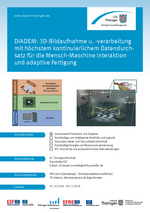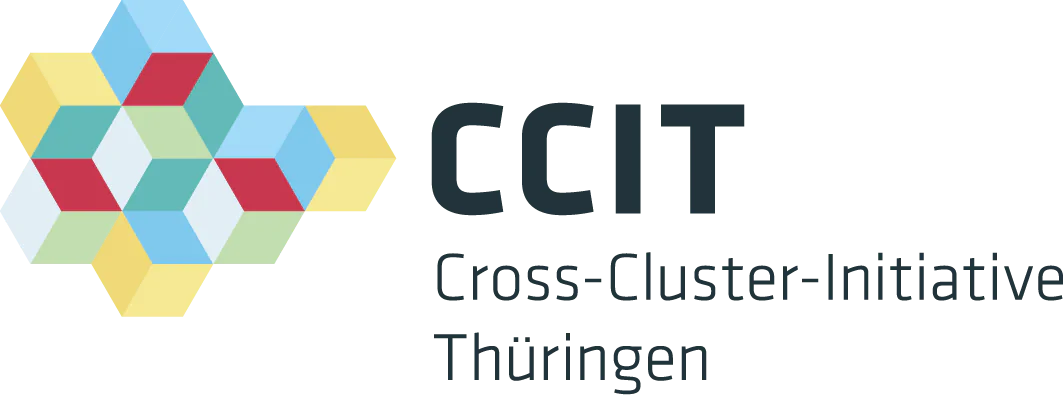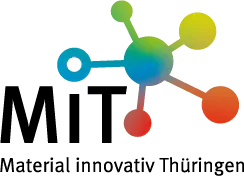Cluster and network organisations
-
Networks
ELMUG eG
The ELMUG industry cluster brings together developers, manufacturers, suppliers, service providers and research facilities in the field of electronic measurement and instrumentation technology in Thuringia. The aim is to expand and consistently develop one of Thuringia's core industries on a national and international scale.
Against the background of the increasing intensity of cooperation between the cluster members and the increased need to develop independent, economic activities, the cluster initiative was transformed into a legal entity on 25.02.2009 with the founding of Elektronische Mess- und Gerätetechnik Thüringen (ELMUG) eG.
The purpose of the cooperative is the economic promotion and support of the members through joint business operations. The declared aim is to expand joint economic action in order to consolidate the market success of the members individually and collectively and thus open up new market opportunities.
FerMeTh Cluster for Manufacturing Technology and Metal Processing in Thuringia
This cluster brings together companies from the entire value chain of metalworking and mechanical engineering, as well as research and educational institutions active in the field of manufacturing technology. Currently 18 members (as of 08/15) are organised together.
FerMeTh sees itself as a platform for comprehensive cooperation between companies, particularly in the area of research and development, in order to sustainably secure and further expand market opportunities and competitiveness – both in the regional and increasingly in the international environment.OptoNet e.V.
OptoNet bundles the interests of more than 90 players in the Thuringian optics cluster. The association promotes their networking and encourages cooperation with the aim of advancing the development of optical technologies in the region. At the same time, competitiveness is to be increased in order to expand the national and international visibility of the cluster. OptoNet sees itself as a service provider for its members, creates a common communication and cooperation platform and is actively involved in location marketing. Particular importance is attached to cooperation with regional, national and international networks in adjacent fields of technology and with market-relevant partners.
In cooperation with OptoNet CoOPTICS GmbH, a 100 per cent subsidiary of OptoNet e.V., a division of labour is taking place in the area of cooperation. The limited liability company (GmbH) is increasingly dedicated to initiating, applying for and supporting research and development projects, actively monitors trends and technologies and advises on financing options.
PolymerMat e.V. Plastics Cluster Thuringia
PolymerMat e.V. bundles the interests of companies in the plastics industry in Thuringia and works closely with regional networks. It provides a platform for communication and cooperation among companies in the plastics industry in innovation, product development and implementation of new technological excellence. All stages of the value chain from plastics preparation, processing, integration and refinement to recycling, including toolmaking and mechanical engineering, are mapped.
The cluster maintains a lively exchange in specialist groups and at events. In addition, the association is involved in public relations, business cooperation, promotion of science, research and education and the associated challenges of the need for skilled workers. As an interface between companies in the plastics industry and politics, the association contributes to the promotion of science, research, education and innovation. It also supports the development of the economic region of Thuringia and the companies in the diverse application sectors of the plastics industry in the Free State.SmartTex Network Thuringia
Electrode shirts for measuring bodily functions, textile solar cells, smart aids for people with disabilities – the SmartTex Network Thuringia promotes new ideas, initiates cooperation projects and organises knowledge transfer between research and industry, e.g. through cross-sector workshops, seminars and symposia. With the help of the network, existing research and development competencies are bundled so that good ideas for smart textiles can be turned into marketable products more quickly.
SpectroNet
The SpectroNet network connects players in the field of visual quality assurance, based on digital colour image processing and spectral imaging, in the various sectors and industries. SpectroNet offers both the transfer of knowledge and cooperation between research and industry, as well as the creation of system solutions for demanding image processing tasks and the development of market reserves. Another goal is to harmonise education and training in this field and to define standards.
-
Interest groups

Cross-Cluster Initiative Thuringia
The Cross-Cluster Initiative Thuringia is an association of active networks from different sectors.
The cooperation between the cluster and network organisations is intended to ensure a regular exchange of experience between the networks, to provide up-to-date information for the management of the individual networks and to transfer research results more quickly into applications, products and services.

MiT - Material innovativ Thüringen
The platform "MiT – Material innovativ THÜRINGEN" – bundles and moderates a wide range of activities to further strengthen Thuringia as a competence region in the field of material development, production and application. Supported by the voluntary, committed cooperation of many partners, the implementation process of the Thuringian Innovation Strategy (RIS Thüringen) is flanked, a topic-related discussion and collaboration platform is provided, material-related activities are initiated/moderated and competencies are bundled, and an objective representation of interests is ensured.
-
Research groups
Ten universities and more than 40 research facilities make Thuringia an outstanding location for science and innovation. With the help of research group profiles, lighthouses of Thuringian research are now to be presented even better to the public in order to further expand cooperation with industry.
The Thuringian Ministry of Economics, Science and Digital Society, in cooperation with the Thüringer Aufbaubank, has launched more than 60 research groups at institutes and universities since 2015. The research topics are broad and strengthen the competencies in the innovation fields of the regional innovation strategy "RIS3 Thuringia".
You can currently view and download the profiles of the Thuringian research groups from the RIS3 innovation field "Industrial Production and Systems" on this page. Further profiles from the other innovation fields are currently being compiled and will be published here in due course.
"Membrane reactor" – development of stable, selective, inorganic membranes and their combination with high-performance catalysts for efficient conversion of materials and energy
Dr. Norman Reger-Wagner "Development of inorganic membranes for efficient material and energy conversion" (Not barrier-free file)
Download
Fibre technology for researching the performance limits of laser fibres + Microstructure technology for overcoming performance limits of fibre-based laser systems
Dr. Johannes Nold Development of new designs and microstructuring processes to overcome performance limits of laser fibres (Not barrier-free file)
Download
Highly efficient simultaneous spectral sensors with large bandwidth and high resolution – HiSPEK
Prof. Michael Rüb Development of simultaneously broadband and high-resolution spectral sensors with compact installation space and high detection efficiency (Not barrier-free file)
Download
Tempered large tools "TemGro"
Dr. Jörg Hildebrand Development and optimisation of tempered large and mould tools (Not barrier-free file)
Download
Achromatic Diffractive Optics on Non-Planar Substrate Surfaces (ADONIS)
Dr. Dmitriy Mitin Using the fundamentals to develop structured surfaces on curved substrates (Not barrier-free file)
Download

DIADEM: 3D image acquisition and processing with highest continuous data throughput for human-machine interaction and adaptive manufacturing
Dr. Christoph Munkelt Development of a system for adaptive 3D acquisition with heterogeneous sensor network (Not barrier-free file)
Download
Green-ISAS: Basic technologies for autonomous Industrie 4.0-compliant sensor/actuator systems
Wolfram Kattanek Research and demonstration of a technology kit for autonomous Industrie 4.0-compliant sensor/actuator systems (Not barrier-free file)
Download
SpaceOptics: Space-qualified joining processes of optical assemblies and their application in hyperspectral imaging and laser technology
Dr. Sylvio Klose Development of a space-qualified plasma-activated joining technology for spectrometer applications in miniature satellites (Not barrier-free file)
Download
Ultrasensitive magnetic field sensor technology with resonant magnetoelectronic MEMS – MAGSENS
Prof. Hannes Töpfer Development of magnetoelectric MEMS for ultrasensitive detection of the weakest magnetic fields (Not barrier-free file)
Download
High-performance optics for (coherent) soft X-rays – HOROS
Dr. Jan Kinast Development and research of novel efficient high-performance optics in the XUV and X-ray range (Not barrier-free file)
Download
XUV-Life – Technologies and methods for imaging and spectroscopy in the water window
Prof. Thomas Stöhlker Research into laser-based water window XUV sources, methods and detectors for imaging (Not barrier-free file)
Download
Ultrasensitive energy-efficient gas sensors made of 2D materials (2D-Sens)
Dr. Frank Schwierz Research into novel atomically thin 2D materials with special properties for gas detection and development of innovative concepts for gas sensors made from these materials (Not barrier-free file)
Download
IntelligEnt: Artificial intelligence and machine learning for the design and verification of complex systems
Georg Gläser Artificial Intelligence and Machine Learning for Microelectronics System Design (Not barrier-free file)
Download
Research into novel manufacturing processes for microstructured fibres
Dr. Katrin Wondraczek New manufacturing process for ytterbium- and thulium-doped special fibres with laser-active properties (Not barrier-free file)
Download
Smart object takeover and handover for user-oriented mobile assistance robotics (SONARO)
Prof. Horst-Michael Groß Research into fundamental methods and technologies for user-centred human-robot collaboration for safe object transfer and takeover (Not barrier-free file)
Download
3DWÄRME – 3D detection by means of thermal image projection and robot handling of transparent complex objects
Henri Speck Capturing the surface shape of transparent complex objects using thermal image projection and robot handling (Not barrier-free file)
Download
Low-emission machines and processes EMiMasch
Prof. Jean-Pierre Bergmann Reducing emissions and increasing energy efficiency in manufacturing technology for mechanical engineering (Not barrier-free file)
Download
Innovative methods for high-resolution X-ray imaging
Prof. Matt Zepf Exploring high-resolution compact X-ray imaging systems and methods through more compact precision X-ray sources (Not barrier-free file)
Download
KERBESEN – Ceramic multilayer components for high-temperature sensor technology and electronics
Prof. Jörg Töpfer Ceramic materials and multilayer devices with applications in high-temperature sensors and electronics (Not barrier-free file)
Download
Quantum optical imaging with entangled photons
Dr. Frank Setzpfandt Fundamental research and investigation of quantum optical imaging with entangled photons (Not barrier-free file)
Download
UKPflex - Ultrashort pulsed laser radiation for flexible manufacturing of customised optical components for individualised production
Michael Seiler Flexible manufacturing of customised optical components using UKP laser radiation (Not barrier-free file)
Download
XUV - Technology and methods for imaging with nano-scale resolution
Prof. Gerhard Paulus Combination of established methods for 3D XUV measurement with nanoscale resolution (Not barrier-free file)
Download










![[Translate to English:] Kay Sawatzky Kay Sawatzky](/filecache/max_0_0/fileadmin/user_upload/leg_cluster/images/ansprechpartner/sawatzky_kay_800x800px.jpg)
![[Translate to English:] Michel Reichardt Michel Reichardt](/filecache/max_0_0/fileadmin/user_upload/leg_cluster/images/ansprechpartner/reichardt_michel_800x800px.jpg)
![[Translate to English:] Alexander Dieser Alexander Dieser](/filecache/max_0_0/fileadmin/user_upload/leg_cluster/images/ansprechpartner/dieser_alexander_800x800px.jpg)